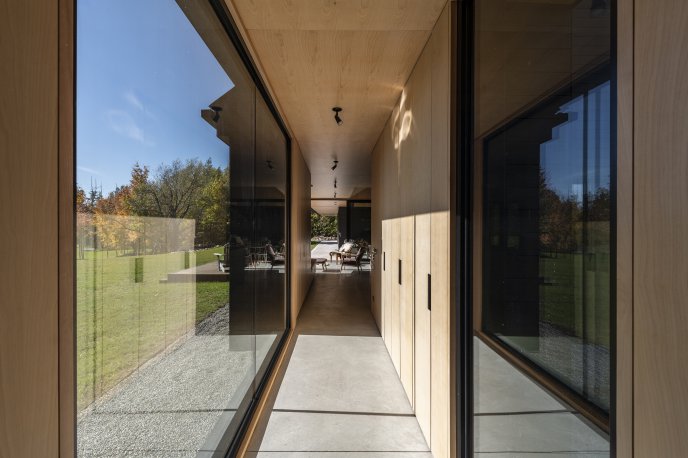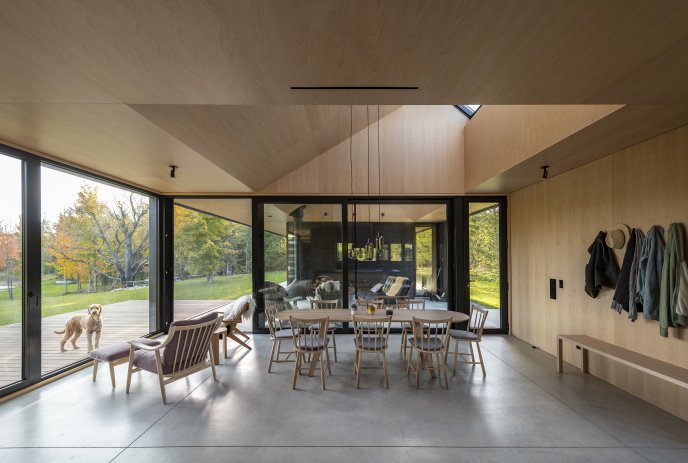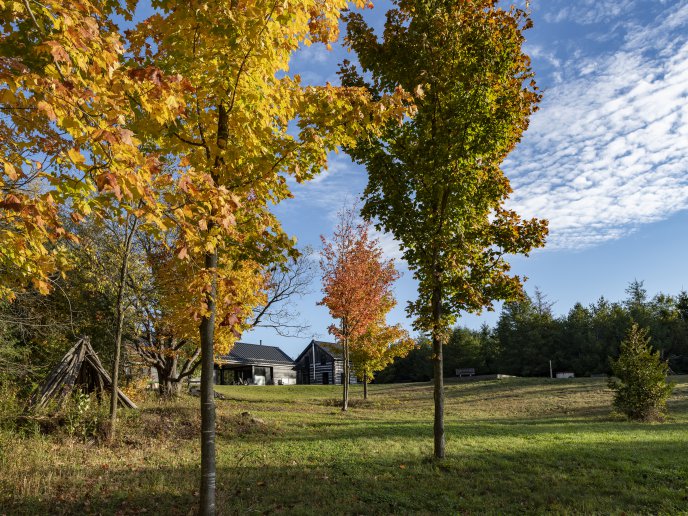Location: Singhampton, Ont.
Architect: Superkül Inc.
OAA Design Excellence Awards Winner
Energy Efficiency and Carbon Stability
Architects must play a role in stabilizing the climate change crisis, lowering greenhouse gas (GHG) emissions in favour of clean power. This year, the OAA required Energy Usage Intensity (EUI) metrics as part of its awards submissions. The lower the number, the less impact the building has on our climate. To learn more, click here.
TEUI: 133.73 ekWh/m2
This striking rural country house was designed for a couple and their two children near Singhampton, Ont., in the Municipality of Grey Highlands. Comprising an existing 19th-century log cabin and a modern addition, the house is sited in a large clearing on a heavily wooded 90-acre site. Beyond direct views to the existing natural wetlands that feed into a restored pond at the south end of the site, a more distant view focuses on a picturesque wind-generating turbine. The dark, low-slung horizontal form of the new addition contrasts and complements beautifully the historic, rustic qualities of the existing cabin.
A glazed corridor links old and new, and the two building forms are unified into a cohesive whole through the material expression of exterior cladding materials—riffing on the rough-hewn logs of the old cabin, charred wood siding is a modern interpretation that ensures visual and textural continuity. A low gable roof was chosen for the new addition to reference the existing cabin as an integral compositional element of the scheme. A linear sequence of spaces divides private and public functions, separated by an exterior breezeway that can be utilized year-round to fully engage with the site and seasons.
This project prioritizes the integrity and retention of the existing 19th-century log cabin, with the gabled roof of the complementary new addition reflecting the region’s historical context of agrarian buildings. Minimal intervention guided the design approach, and the low-slung massing of the newly built structure defers to the old cabin through its lower height, articulated as an elongated bar reaching out into the landscape. The home embodies openness and transparency, reflective of the welcoming nature of the clients, and represents a positive contribution to the region and community while establishing a standard for modest architectural expression in residential building.
By retaining the existing 19th-century cabin rather than building completely anew, material usage is substantially reduced. While glazed walls admit vast amounts of natural daylight, deep overhangs and sliding wood screens mitigate excess solar gain. Operable skylights encourage passive ventilation eliminating the need for air conditioning, improving air quality for the inhabitants. With sustainability as a consistent priority for the architects, other attributes include high-performance glazing, a heat-recovery ventilation system paired with a super-tight building envelope, and slab, wall, and roof insulation levels that significantly improve on minimum requirements imposed by the Ontario Building Code.

Image Credit: Alex Fradkin

Image Credit: Alex Fradkin

Image Credit: Alex Fradkin